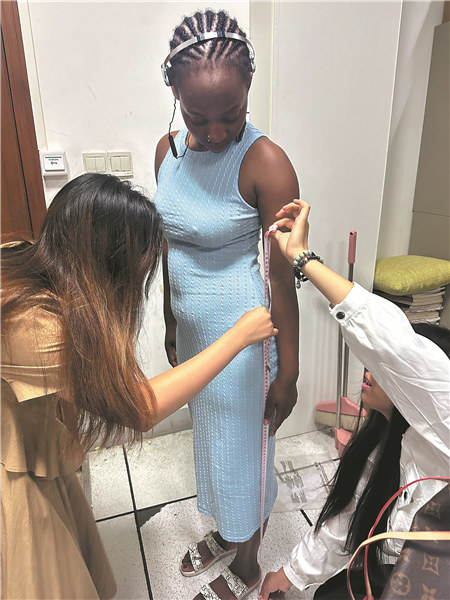ai takes ancient fashion to next level

cai chenhan (left) measures a customer in hangzhou, zhejiang province. [photo provided to china daily]
a fashion company founded in october 2021 by generation z students is bringing artificial intelligence to the world of traditional chinese clothing — known as qipao — and has created a design database that no ancient clothing designer could have imagined.
the team of 15 designers is called lin chun jie qi, suggesting a traditional chinese poetic aesthetic. "lin chun" references "springtime approaching" and "jie qi" means "to be both sophisticated and exquisite." they are led by a young founder, 19-year-old cai chenhan, an art management major at zhejiang university of finance & economics.
all members of the team are from gen z. with their youthful vision, they infuse modern elements, patterns and design concepts into traditional qipao, making the clothing more appealing to the younger generation. they employ advanced weaving techniques to imprint intricate patterns and create styles that resonate.
cai comes from a family immersed in the qipao-making tradition, with both her mother and grandmother designing primarily for older women. growing up in that environment, cai began learning the craft from a young age.
"my childhood dream was to become a fashion designer," cai said. "while my family has been in the business for generations, they never ventured into custom design or design services. that's why i chose to study design — i wanted to carry the tradition forward."
cai's team is mostly stocked with fellow students from zufe, particularly those studying graphic design. the university's international school naturally has many foreign students. cai and her classmates also collaborate with the zufe's oriental college on fashion design projects.
they introduce their designs by having international students wear the clothing in chinese fashion shows on campus. this opportunity led cai and two of her classmates to embark on the path of qipao design, initially focusing on visual design and user analysis.
in 2021, cai founded hangzhou lin chun jie qi e-commerce co. in just three years, her team won a silver medal in the internet innovation and entrepreneurship competition for college students and a gold medal in zhejiang province's 14th challenge cup entrepreneurial plan competition. they have sold between 3,000 and 4,000 pieces of traditional clothing in one year, with 30 percent of sales coming from abroad.
the secret to their success was in creating the largest database of qipao samples in china. traditionally, qipao patterns were hand-drawn on leather. cai's team digitized and organized 19,000 examples. these designs are now used to train ai models, which assist in generating altogether new qipao patterns. the team often works late into the night to perfect the designs and build their efficient, automated design database.
using ai was a major breakthrough for qipao. the designs are updated and fresh, yet authentic, based on the accumulated information in the database. by inputting body measurements, fabric types and style preferences into the system, the team can generate custom qipao designs.
this revolutionary approach has drastically reduced the design cycle from 10 or 15 days to just two. and the database has significantly improved product turnover.
"one of our biggest challenges was managing inventory," cai said.
today, lin chun jie qi's qipao can be found in eight countries, with 46 stores abroad, mainly in southeast asia. clients can also order custom-made qipao, with details such as fabric, patterns and design elements tailored to their preferences.
"the customization process involves extensive communication about styles, fabrics and detailed craftsmanship, right down to the height of the slits and the shape of the buttons," said yu dian, a student at zufe and the head of marketing and supply chains for lin chun jie qi.
the team's success is not only the result of hard work but also the result of support from their school and society.
during summer and winter breaks, the team conducted in-depth market research, collecting data on different ethnicities and preferences for clothing patterns. "we mainly focused on analyzing southeast asian and western markets," cai said. "western clients prefer qipao with more skin exposure, while southeast asian clients prefer knee-length qipao with padded shoulders or cap sleeves. their dress occasions are also more diverse, ranging from high-end balls to casual gatherings."
the team's influence has expanded beyond zufe, reaching other universities in hangzhou. every quarter, they try to host qipao festivals and cultural exchange events on various campuses.
"our goal is to truly extend the reach of the qipao, contributing youthful energy to the promotion of traditional chinese culture," cai said.
-
hangzhou's digital trade expo to be fully powered by green electricity
september 13, 2024
-
hangzhou paralympians return victorious from paris
september 11, 2024
-
7th hangzhou international day kicks off
september 6, 2024

